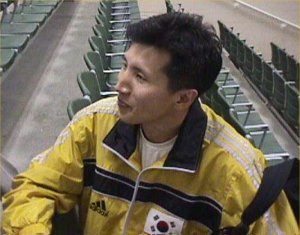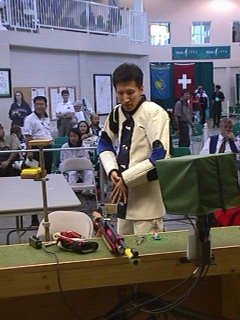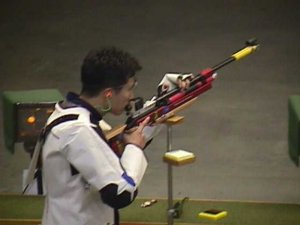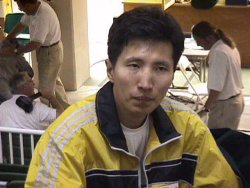INTERVIEW WITH LEE EUN-CHUL
Lee Eun-Chul was one of the world’s top rifle shooters in the 1990s. He is an Olympic Gold Medallist in English Match and World Champion in 3×40. We spoke to him at the 2000 Atlanta World Cup.
How did you get started with shooting?
As a young boy I liked guns. I went to an amusement park and they had airgun shooting, and I won a lot of prizes from there. I got interested in shooting and so I decided to shoot.
Did you grow up in the country or the city in Korea?
I was in the city, and I found a gun club. During the time when I started there were many air rifle clubs, but now there’s no clubs any more.
Why not?
Because of Korean law I think. They are more strict these days.
When you found the gun club, how did you get started in competitive shooting? Were they shooting only International style?
When I started I was 11 years old, I was very young. So I wasn’t thinking about going to competition because there was no competition for the kids. We had a competition for the high schools in Korea and also all the shooting done in Korea is the ISSF shooting. There is no Korean shooting like NRA matches. The only thing that we do is strictly by ISSF. So I started with air rifle in Korea, then I came to the United States in 1980, and that’s when I started shooting junior shoots.
Did you come here to college?
I came to the US because my father came to study. He was in Michigan State University and I was in middle school. Then I went to high school. Then I moved down to Texas because in 1984 I was notified by my country that I have enough skill to go to the Olympics. So they sent me to the pre-Olympics and I met Mr Lanny Bassham. He was my coach for ten years thereon.
So Lanny’s helped you out quite a lot then?
Everything I learned about the mental side I learned from him.
And what do you find is the most significant thing about mental shooting; what helps you the most that you’ve learned from him?
The first thing is when I was practicing my scores were going up very fast, from 1980 to 1982. In 1980 I was just a small time shooter, in 1982 I was the Michigan State Champion. I think in 1983 at Camp Perry I won a couple of matches there, and so everybody got surprised. But my score just stuck in that 1140 (range), it wouldn’t go up. Every years my score had been going up by ten points, but for some reason it got stuck in the 1140s and it wouldn’t go up any more. So I thought there was something wrong with me or my methods. But after six months of working with Mr Lanny Bassham my score just jumped up to the 1160s. Everything that I learned, my skills didn’t change – my position didn’t change, nothing changed except what I think. Before, 1140, I thought it was a high score. When I went to Mr Bassham he told me about 1180s, you know. He said, now it’s time to shoot 1180s, otherwise you won’t be able to win at all. And he keeps on giving me positive images, and that’s when my scores just went up so high. In 1987, that’s when I left to go back to Korea, that’s when I went to shooting 1170s, many times. So I was favored to win in the Olympics, but I didn’t win in 1988. Then I quit shooting and I stayed to study for two years. Then I went back to Korea in 1990 and I practised for about three months and I won the World Championships. Then two years later I won the Olympics in Barcelona. In 1996 I got I think it was seventh place in prone in Atlanta.
What kind of equipment are you shooting?
I’m was using Anschutz until last year, I was using Anschutz air. Before the tryout in Korea it broke down so I wasn’t able to fix it. I changed my gun to a Feinwerkbau and I’m shooting really well with that air rifle so I decided to stay with that up until the Olympics. So I’m using Feinwerkbau in the air rifle and I’m using Anschutz in the 3 Position and prone.
How do you set your sights, do you change your apertures for the range conditions?
Yes I do. Normally with the air rifle I don’t use any filters. I only use the iris. Normally I use a 3.2mm, but when I came here it was a little darker so I changed to 3.3mm.
What about on the rear, do you do anything with it?
I don’t change it, I just leave it.
When you’re shooting outdoors you use filters?
Yes. I just use colors, whatever looks the best on the day. But I don’t like the polarized because it seems to get you darker and darker. The more you practice you want it darker and darker, so I decided not to use the polarized, I just use the colors.
What’s your funniest shooting experience?
This is not a funny thing, but when I was shooting high power, not at Camp Perry, in practice. For some reason my score wasn’t going up, so my mum decided to make some dummy ammo.
Your mom?
Yes, my mum makes my ammo. She made some dummy ammo and mixed it up with the real ammo. I could feel the difference in weight, so she would put it in so I wouldn’t know if it was the live or the funny ammo. When she put it in, I was sure it was a dummy load, so I held it calmly and made sure that I wouldn’t jump when it fired, but I fired and the gun jumped up and hit my eyebrow and I had a little bleeding. But that time I shot close to a 10.9. So I found out that it was my mistake, so after that I practiced with the dummy ammo mixed up. It was a good experience for me.
What’s your favorite food?
I like tacos.
What do you do in Korea now, do you shoot full time or do you have another job?
I have a job in Korean Telecom. But most of the time I shoot. And if I quit shooting I go to work for Telecom.
What kind of work are you doing for them? What did you get your degree in?
I’m a computer science major. But now I don’t have any part in my company, they just sponsor me. I will have a job when I quit shooting.
Do you expect to keep shooting after Sydney this year?
I want to become a coach, but I will keep shooting.
Since you started shooting as a junior, what is something you would tell a junior starting out? What’s the most important thing you think a junior should know when they begin shooting?
The most important thing is that you have to keep promise to yourself. If you say you will something then you must do it. Don’t lose to yourself, you have to win yourself always. So if you promise that you’re going to do something, then you do it.
So you set a goal and you work towards it?
Yes, that’s correct. Be patient, and even like one day’s practice can be bad, the next day will be good, and bad and good. If you shoot bad you’ll feel bad, when you shoot good you’ll feel good. But when you see the whole picture it’s like dropping water into the bowl. Sooner or later it’s going to fill. So don’t worry about the single drops of water, just think of the whole picture of the bowl.
What’s one thing you wish you could have learned earlier?
I was very very lucky that I met Mr Bassham. I think (his training) is very easy, but it’s really hard to follow, unless you have a good outlook. That’s what I was saying about if you have a goal you have to work towards it. It’s easy to set a goal, but you have to follow it, that’ the thing. I did it and it worked for me. My sister tried it, but she didn’t follow too much and there is the difference.
Does she shoot also?
Yes, she used to shoot when she was young.
You said there are no clubs left in your country for shooting? We don’t have clubs, we have teams like a Bank team, we have a Korean Telecom Team. We also have many City Hall teams. So these city halls, they sponsor the shooters. They don’t just given them money, they give salaries and they help the shooters to shoot good scores. They have coaches and everything.
Do you get juniors that come into those programs?
What we do is we have a lot of junior shooters, we have about 2000 juniors. You can see that we have two junior women that came here, they are both in high school. Their competition is almost as hard as the world championships. Normally in Korea you have to shoot over 397 to win, this is in high school. So we have a lot of good high school shooters. But the thing that I don’t like is they shoot only air rifle.
Is that because of your laws?
No, it’s because it’s cheap, and if they want to shoot 22 it’s going to cost them a lot for ammunition and all these things. You will see that our air shooters are just shooting air rifle, 3 position shooters just shoot 3 position. It’s kind of hard.
How old are you now?
I’m 33 in the United States. 34 in Korea.
Why is that?
In Korea when you are born you’re one year old.
Anything else you would like to add?
This Olympics I am going to in Sydney is my fifth time and I think every time going to the Olympics was hard because we have a lot of good competition in Korea. We have many good shooters in Korea who shoot very well. But every time that I came through it was because of my mental (outlook), I was able to make the team every time. I’m proud that I’ll have been to the Olympics five times in a row. I don’t know when it’s going to end, but for sure I’m going for six in a row.
